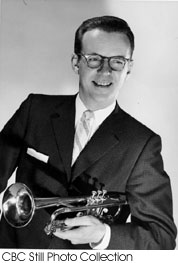
Year Born: 1919
Year Died: 1998
Pioneer
Gimby, Bobby (1919-1998)
Canada was a young country in 1967 – young in demographics, in innocence, optimism and energy. It was Canada’s Centennial Year and the world was coming to Montreal to see the World’s Fair, Expo ’67. Bobby Gimby’s best-remembered song CA-NA-DA! (“One little two little three Canadians…”) fitted the times, especially sung by children as in the best-selling 1967 record by The Young Canada Singers.
In the preceding 25 years Bobby had achieved national recognition as a dance band musician and leader, a member of Canada’s most popular daytime radio program The Happy Gang, and had had his own television show. But he hadn’t made a record in his own name.
He was born to a musical family in Cabri, Sask., a town 55 km northwest of Swift Current. When he was six, his father bought him a cornet from an Eaton’s catalogue. Soon he was playing in local concerts with the Cabri Brass Band and he won honours in the Saskatchewan Music Festival.
The Gimby family moved to Vancouver and Bobby joined the famous Kitsilano Boys Band under founder Arthur Delamont. Canada’s most famous band leader, Mart Kenney, lays claim to having “discovered” Bobby. Mart and his Western Gentlemen had been playing a one-nighter in Chilliwack in the Fraser Valley in the late 30s when the young Bobby jumped onto the stage with his trumpet and sat in with the band. Mart recalled his dazzling solo performance of The Flight of the Bumble Bee. After about a year playing with Sandy Desantis’s Band at the Palomar Ballroom in Vancouver, Bobby received a call from Mart to take over departing Jack Hemmings’ chair as first trumpet. For the next two years, Bobby travelled with the Western Gentlemen, playing for dancers from Vancouver to Toronto.
In 1942, Bobby, now married, settled in Toronto. He left Mart and formed his own band which was booked by an agency owned by Mart. He was chosen to replace trumpeter Bob Farnon as a member of The Happy Gang which ran on the CBC Network five days a week until 1957. Bobby Gimby’s Hoedown followed.
When TV arrived in 1952, Bobby Gimby’s orchestra was one of the bands featured on Monty Hall’s first television show which was dedicated to highlighting Canada’s premier dance bands. In 1958 he became a regular on CBC-TV’s Juliette show where he was featured as a novelty singer and trumpet player.
CA-NA-DA, the Centennial song, followed a suggestion by John Fisher who was known as Mr. Canada and who had been appointed Centennial Year commissioner. Bobby’s song was inspired by children marching in a St. Jean Baptiste Day parade in Quebec. He soon became famous as the media followed him across Canada. He dressed in a cape and used a jewelled but battered trumpet, and was tracked by singing children wherever he went. For that, he became known as Canada’s Pied Piper. Towards the end of Centennial year, Bobby turned over future royalties from the song to the Boy Scouts of Canada.
That same year he was rewarded for his musical contribution to the Canadian identity and the success of Canada’s 100th birthday by being appointed an Officer of the Order of Canada.
During the early 60s, Bobby had been invited to Malaysia. He wrote a song for the tour called Malaysia Forever. It was later adopted as the national anthem of Malaysia.
Following his return to Toronto, Bobby reformed his dance band and was booked into the Oak Room of the King Edward Hotel. In 1963 he recorded for the Canadian Talent Library 12 trumpet solos in arrangements for trumpet and strings by Johnny Burt. He also recorded a dixieland album for CTL.
Failing health caused Bobby to retire gradually. He died in North Bay, Ont. in 1998.
Written by Jerry Fairbridge – April, 2003
